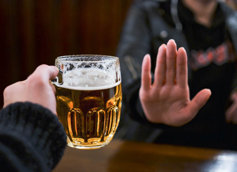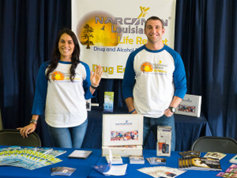Narconon New Life RetreatTakes Part in Alcohol Prevention Program

Alcoholic drinks are legal and widely available throughout most of the United States, but that doesn’t mean that they’re safe to use. While most adults will occasionally kick back during the summer and drink a few beers or glasses of wine, they also need to realize that those very drinks are responsible for 3.3 million deaths around the world every year.
If that figure is surprising, it shouldn’t be. Alcohol is a poison. That’s how our bodies treat it, anyway. When someone drinks alcohol, her body immediately starts being damaged by this toxic substance. The body will also immediately go to work trying to process the alcohol out in order to keep itself safe. With only a few drinks, that person’s awareness, motor control and reaction time will start to drop. With more drinks, the person can completely pass out.
These reactions to alcohol are what cause so many fatal auto accidents every year. Millions of Americans think that they can safely drive their cars even though they’ve been drinking. The poisoning of their minds and bodies from alcohol causes them to lose control and injure themselves and others when they crash.
Summer is the worst time of the year for drunk driving and the injuries and deaths that it causes, so the Narconon New Life Retreat in Louisiana is stepping up to make a difference.
Changing Minds about Alcohol

While the occasional alcoholic beverage is not harmful enough to do major damage to an adult, even small amounts can be dangerous for younger people, such as teenagers. They aren’t accustomed to drinking alcohol (and their tolerance level isn’t as high), so it doesn’t take much to make them dangerously intoxicated.
It really isn’t safe for young people to be drinking alcohol at all. Starting young can lead to these children and teenagers becoming life-long alcoholics that harm themselves and the people around them. In order to prevent this outcome from occurring, it’s necessary that we start changing minds about alcohol early on.
Instead of letting our children have sips of beer, for example, they need to understand that alcohol is actually bad for your body, and the decision to try it is best reserved to adults. Scientific research has actually shown that letting your children have small amounts of alcohol early on leads them to use a lot more alcohol later in life, so just avoid giving your kids alcohol altogether.
It’s also important for parents to talk to their teenagers about the dangers of drinking in high school and college. Instead of it being a “rite of passage” to drink, young people need to understand how many lives are lost to alcohol poisoning from binge drinking. When they have all the facts, more young people might simply decide to stay clear of alcohol.
Educational Tools

Narconon New Life Retreat is also helping by providing free educational materials about drugs to the public in person and through its website. These materials debunk common misconceptions about drugs so that families can have the facts.
For example, one of the most common modern myths about drugs is that marijuana is safe to use. The truth about marijuana is that it does have damaging effects on the body and mind, and can be particularly dangerous for young people. Just because it has been legalized in some states it does not mean that parents should think it is safe for their own teenagers or anyone else to use.
With these educational materials, hopefully, more lives can be saved from the completely unnecessary injuries and deaths caused by alcohol and drug ignorance.


 ®
®